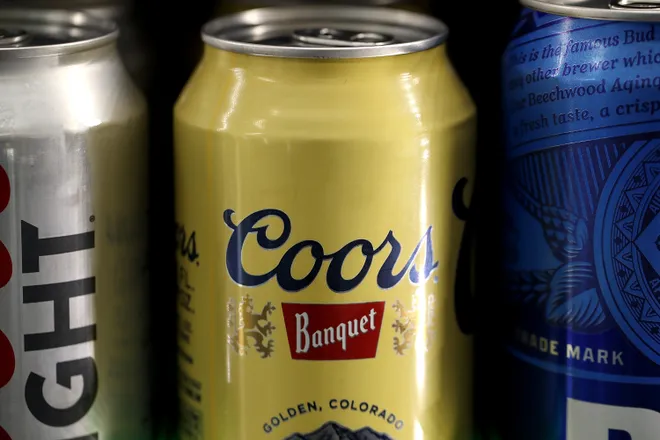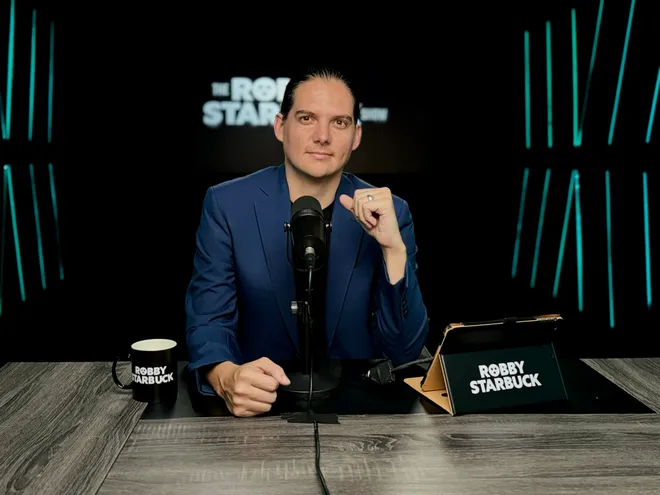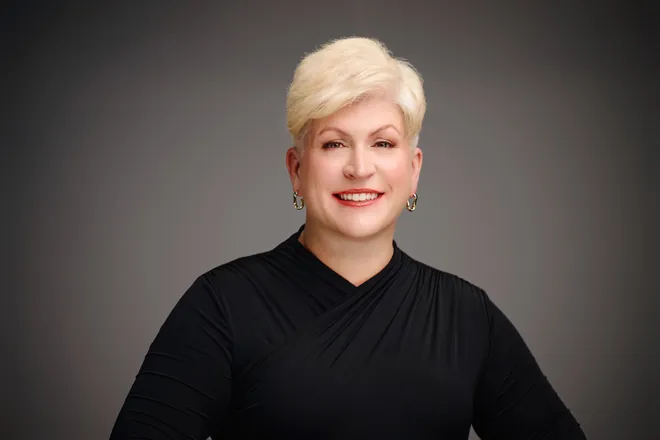This anti-DEI activist is targeting an LGBTQ index. Major companies are listening.
One of the concessions Molson Coors made when it bowed to pressure from activist Robby Starbuck and retreated from some of its diversity, equity and inclusion initiatives was withdrawing from a benchmark index the Human Rights Campaign uses to measure how friendly a company’s policies are to LGBTQ+ people.
In response, Starbuck resurfaced a $1 million donation Vizzy Hard Seltzer – owned by Molson Coors – made to the HRC four years ago. “Today Coors wants no association with them,” Starbuck told his 600,000 followers on social media platform X.
The maker of Coors Light isn’t the only company distancing itself from the LGBTQ+ advocacy group.
Six out of seven companies targeted so far by Starbuck – Molson Coors, Harley-Davidson, Lowe’s, rural retailer Tractor Supply, distiller Brown-Forman, which makes Jack Daniel’s, and carmaker Ford – have all pledged to stop providing workplace data for the HRC’s Corporate Equality Index.
The seventh – tractor maker John Deere – said it would no longer support “social or cultural awareness parades, festivals or events” but didn’t mention the HRC.
Separately last week, Stanley Black & Decker, which has not been targeted by Starbuck, overhauled its DEI efforts and said it would end its participation "in all external culture surveys conducted by third-party organizations" including HRC, according to an internal memo obtained by USA TODAY.
Drew Keller, an advocate for lesbian, gay, bisexual, transgender and queer employees who analyzed dozens of Starbuck’s posts, says he knows why.
Though Robby Starbuck describes himself as an opponent of DEI, half of his attacks are aimed at corporate support of gay, lesbian and transgender people, while a much smaller fraction – 9% – target racial diversity, Keller’s analysis found.
“This is not just a broadside against DEI,” Keller said. “It’s really a targeted campaign against LGBTQ inclusion.”

Anti-DEI campaign builds on Bud Light, Target backlash
Since the 2020 murder of George Floyd, companies have come under repeated fire for programs and policies to boost racial equity in their workforces and leadership. Increasingly companies are also facing online activism from customers unhappy with public stands on gay, lesbian and transgender rights.
Once the nation’s most popular beers, Bud Light, owned by beer giant Anheuser-Busch, slipped to third in the rankings after last year’s social media campaign with trans influencer Dylan Mulvaney.
When activists confronted employees and vandalized displays last year, national retail chain Target moved its Pride displays from the entrances to the back of stores. This year, Target scaled back its Pride collection and didn’t carry the collection in all stores. Other companies also celebrated Pride Month more quietly than usual.
Riding the wave of these consumer boycotts, Starbuck, 35, uses social media to pressure corporate America to back off even more commitments. His efforts have won praise in some circles.
Polling conducted in July by Morning Consult found that, while a majority of U.S. adults – nearly 3 in 5 – still support corporate DEI programs, men, Republicans and older adults were most likely to disapprove.
Morning Consult also found that men and right-leaning consumers negatively view brands that promote diversity and inclusion as “woke.”
“Companies would be wise to remember that they need conservatives to buy their products, too,” Starbuck told USA TODAY.

How corporate America helped usher in gay rights
Corporate America’s embrace of LGBTQ+ rights was the result of decades of protests and boycotts from LGBTQ+ activists that transformed once indifferent, even hostile, companies into powerful allies.
In recent years, big brands have stepped up to promote LGBTQ+ equality with more inclusive benefits and policies.
Today, 93% of Fortune 500 companies prohibit employment discrimination by sexual orientation and gender identity, and about three-quarters have transgender-inclusive benefits, according to the HRC. Corporations also publicly supported same-sex marriage and opposed laws that would restrict transgender people’s access to public restrooms.
The HRC’s Corporate Equality Index played a key role in ushering that social change.
When it launched in 2002, the index evaluated 319 companies, with only 13 earning a perfect score of 100. Last year, the index scored more than 1,300 companies, hundreds of which had a perfect score, including Ford, Molson Coors, Lowe’s and Brown-Forman and covered a wide range of workplace policies including equal health insurance benefits for same-sex couples and transition care for transgender employees. This year, HRC says it will have a record 1,400 companies participating.
While some companies are scaling back DEI initiatives in a polarized political environment, Joanna Schwartz, a marketing professor at Georgia College & State University, says she doubts they will turn their backs on this decadeslong allyship with LGBTQ+ people.
“One of the things that a lot of companies are trying to do is not be the next Bud Light, and Robby Starbuck is really playing on that,” Schwartz said.
Molson Coors told employees in an internal memo that dropping out of the HRC index and other rankings would not affect the benefits it offers or reduce its commitment to a culture “where every one of our employees knows they are welcome at our bar.”
Brown-Forman told USA TODAY it would "continue to foster an inclusive work environment where everyone is welcomed, respected, and able to bring their best self to work."
“I think that companies are willing to go through the motions to try to tamp down any kind of traction this might have, but are companies going to necessarily completely change the way they operate because of him? I really don’t think so,” Schwartz said.
LGBTQ+ people and allies vote with their wallets
With good reason: LGBTQ+ people and their allies tend to vote with their wallets, as they did when Target and Bud Light caved to pressure.
LGBTQ+ people in the U.S. have an estimated $1.4 trillion in purchasing power, according to LGBT Capital, which researches the LGBT consumer segment.
At the same time, 7.6% of U.S. adults – and 1 in 5 young Americans – identify as lesbian, gay, bisexual, transgender, queer or a sexual orientation other than heterosexual.

According to a recent HRC survey, 8 in 10 LGBTQ+ adults would boycott a company that rolled back DEI initiatives and over half would urge others to boycott the company, too.
What’s more, 1 in 5 LGBTQ+ adults would quit or start looking for a new job if they worked for a company that rolled back DEI, the survey found.
Joe Montello, who managed Tractor Supply’s Ray Brook, New York, store, says his heart sank when Tractor Supply ended its DEI programs in June. So he voted with his feet and quit his $80,000-a-year job.
“I had customers who were transgender, gay and lesbian, who were people of color,” he said. “So when they said they were aligning their values with their rural customer, I felt like they were alienating a large portion of their customer base.”
Most companies will not unwind commitments to LGBTQ+ people because being more inclusive is smart business in an increasingly diverse world, said Erin Uritus, CEO of Out & Equal, a workplace equality nonprofit organization.
“While it’s disappointing to see a handful of companies make shortsighted decisions that upend their core values and undo years of strategy to appease right-wing activists, I know that in the long run the business of belonging will prevail,” Uritus said.
HRC told USA TODAY it would continue to score companies that don’t provide information for the index. The companies that pulled back from their DEI commitments have had 25 points shaved from their score. On its website, HRC is inviting supporters to send messages of protest to corporate executives “who have cowardly succumbed to these antibusiness demands.” So far, it says nearly 140,000 HRC supporters have sent messages, the organization said.
“These attacks are a reflexive backlash to the immense progress we have made as a community in ensuring safe, fair and inclusive workplaces," said Eric Bloem, HRC’s vice president of programs and corporate advocacy.
Disclaimer: The copyright of this article belongs to the original author. Reposting this article is solely for the purpose of information dissemination and does not constitute any investment advice. If there is any infringement, please contact us immediately. We will make corrections or deletions as necessary. Thank you.







